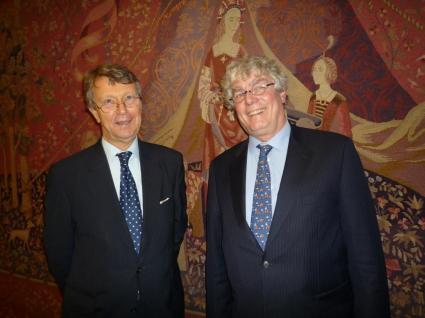Towards a Reinforced Collaboration between The Hague Conference and the UIHJ
On 19 January 2010 a delegation of the UIHJ led by its president, Leo Netten, went to The Hague to meet the general secretary of The Hague Conference on Private International Law, Hans van Loon and its 1st secretary, Christophe Bernasconi, in order to consider the bases of a reinforced collaboration
Hans van Loon, General Secretary of The Hague Conference on Private International Law, Leo Netten, president of the UIHJ

The relationship between The Hague Conference and the UIHJ is historically very close. The UIHJ initiated The Hague convention of 15 November 1965 on the service abroad of judicial and extrajudicial documents in civil or commercial matters. The UIHJ never misses an occasion, mainly at the time of the African seminars, to draw the attention of the authorities to the interest which this convention in terms of simplification and acceleration of the cross-border service of documents represents. The Hague Conference intervenes regularly within the framework of the conferences organized by the UIHJ, the latest to date being the international congress of Marseilles in September 2009. On the other side the UIHJ takes part also regularly in the working sessions of the Hague Conference. It is quite naturally that the two organizations agreed that it would be reciprocally beneficial for them to reinforce their collaboration.
Leo Netten, president of the UIHJ, went with Roger Dujardin, vice-president, and Mathieu Chardon, 1st secretary, to the head office of the Hague Conference on 19 January 2010 in order to provide the foundations of this co-operation.
The delegation was cordially accommodated by Hans van Loon. Discussions lengthily took place with Christophe Bernasconi and Marta Pertegas, secretary. The exchanges resulted in determining three common axes of convergence. The first turns around training and promotion. A reinforcement of the presence of the Hague Conference during the international seminars of the UIHJ, in particular on the African ground, is wished. The second relates to the e-justice section, in particular the use of new technologies. The third relates to enforcement which The Hague Conference considers again while the UIHJ prepares a world code of enforcement which will be presented at the time of the next congress of the UIHJ in Cape Town (South Africa) in 2012. The possibility of constituting a working group between the two organizations was also mentioned.
To evoke these points, the UIHJ should be invited to take part in the next working session of The Hague Conference which will be held in The Hague at the beginning of April 2010.


